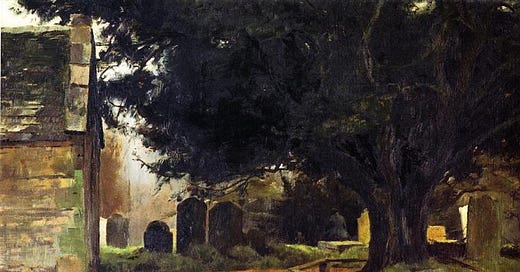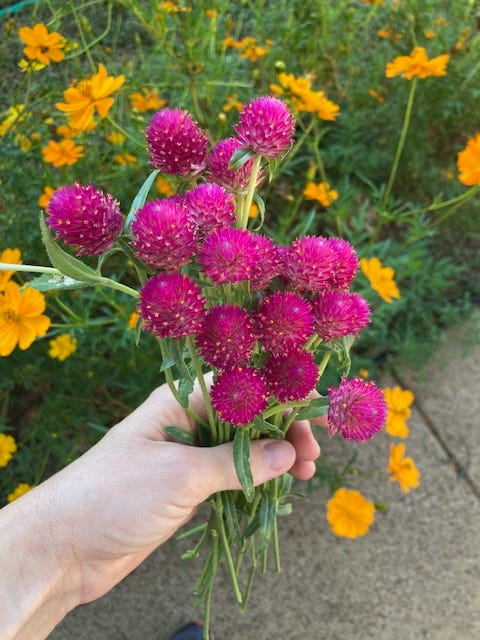Virtue Grows in Graves
If good deeds could be traced to their source, how beautifully would even death appear!
In Dickens’ quirky novel, (which reads almost like a fairy tale) The Old Curiosity Shop, Little Nell muses on the fate of the dead while in a graveyard near the end of the story. She laments, “I do rather grieve to think that those who die about us, are so soon forgotten.”
The schoolmaster gently corrects her:
“And do you think, that an unvisited grave, a withered tree, a faded flower or two, are tokens of forgetfulness or cold neglect? Do you think there are no deeds far away from here, in which these dead may be best remembered?”
I love what he says to her—in essence: do not equate overgrown graves with unremembered people. The schoolmaster goes on to say:
“Nell, Nell, there may be people busy in the world at this instant, in whose good actions and good thoughts these very graves—neglected as they look to us—are the chief instruments!”
And finally:
“Forgotten! Oh, if the good deeds of human creatures could be traced to their source, how beautifully would even death appear; for how much charity, mercy, and purified affection, would be seen to have their growth in dusty graves!”
What a hopeful and inspiring thought! How much charity and affection have their growth in dusty graves? It is a beautiful idea: what do I do that has its origin in the far-off dead? I wonder just how many of our deeds and thoughts have their origins in the dead, one way or another?
We often speak of the dead “living on in our memories,” but I wonder if it is more accurate to say that the dead live on in our actions. Memory fades, but example can carry on generation after generation.
I love the idea of each of us remembering well those who have died by our own virtuous thoughts and good deeds. Uncared-for graves do not mean the dead have been forgotten. In this way, perhaps the way we can best remember and honor those who have passed on is to emulate their goodness in our own lives.
It is also interesting to note that while there is a limit to the flowers we can plant and grow on one small grave, there is no constraint to the ripples of influence one life can have, even hundreds or thousands of miles away from the final resting place of any good soul.
When I think of people who have changed my life for the better, those who have had the most profound influence of me are my four grandparents. How can I best honor my beloved grandparents? Taking flowers to plant near their graves is lovely, but doing my best to live well—as they showed me!—is much better.
My own grandparents have now all passed on, and their graves are nearly 2,000 miles away from where I live. Because of this distance, I am not able to visit their graves regularly, and certainly cannot tend to any gardening near their graves.
But—neglected graves do not mean neglected people—I think of my grandparents often. My mother’s father was always (and I do mean always) building or tending fires. In the winter he made blazing, cozy fires in the kitchen fireplace, and anytime we visited in the summer he was caring for a big, crackling fire outdoors. Now, with my own three sons (and daughters!), when I watch them gathering wood or learning how to build a fire, I often think of him.
As I write this, I realize that I need to tell my children more stories about their great-grandparents, so they can know them, love them, and try to carry on some of their very best qualities, thus, metaphorically, “tending their graves,” and honoring their lives and my memories of them.
This idea of “growth in dusty graves” is echoed in the garden. When I compost carrot peels and dead leaves and grass, I am laying down hundreds of little dusty graves from which will grow abundant fruit, vibrant flowers, and crimson beets. Death leads to life here in my humble garden beds as it does everywhere else.
When I am gone, what will I want my children to remember about me and who I was? What good deeds do I want my children to trace to my example—always, of course, tracing to the ultimate source of Goodness himself.
How beautifully would even death appear.
I can’t finish my thoughts here without tying in the end of Middlemarch, the novel I just finished reading with my Catherine Project reading group. Apologies in advance, for these are the most oft-quoted lines from the novel; I have found that when I read a quote again and again my brain tends to glaze over when I read it for the 47th time. Hopefully you are able to see it in a new light this time:
But we insignificant people with our daily words and acts are preparing the lives of many Dorotheas…[and] the effect of her being on those around her was incalculably diffusive: for the growing good of the world is partly dependent on unhistoric acts; and that things are not so ill with you and me as they might have been, is half owing to the number who lived faithfully a hidden life, and rest in unvisited tombs.
Insignificant. Unhistoric. Hidden. Unvisited.
We don’t like these words—especially when they are used to describe the entirety of our lives. And yet—there is a Christian paradox here; the men and women who are greatest in the kingdom of heaven are those who care nothing for status, those who embrace and live faithfully their humble, hidden lives.
But the beauty that lies in death is that those we love who are no longer with us, have planted seeds in our hearts that will sprout and grow, influencing for good an untold number of people.
How beautifully would even death appear.
Keep seeking the virtuous and the lovely,
Shannon
Previously:
Last year I wrote an essay on sending a letter to your mother; it is so timeless; mothers love heartfelt expressions of love and appreciation any day of the year!
AI Disclaimer: No part of this essay was written using AI. All of the organization, ideas, writing and editing are a product of my fallible and finite mind. I have never used AI to write anything and I never will.







That quotation from Middlemarch strikes again! My two grandmothers played a significant role in my younger years - I don't even know if they have a gravesite but their influence is baked into me. Loved your parallels with Dickens.
Beautiful. I come again and again to the analogy of death as it nurtures life, hard not to when you are a gardener! Also relate very much to what you've said about the tremendous impact your grandparents have had on your life. I, too, live far from where my own grandparents' remains are buried, but I think of them often and I hope I carry on their "muchness" in my life.
Too bad you have to add an AI disclaimer, but I know people will appreciate knowing that (as I do!)